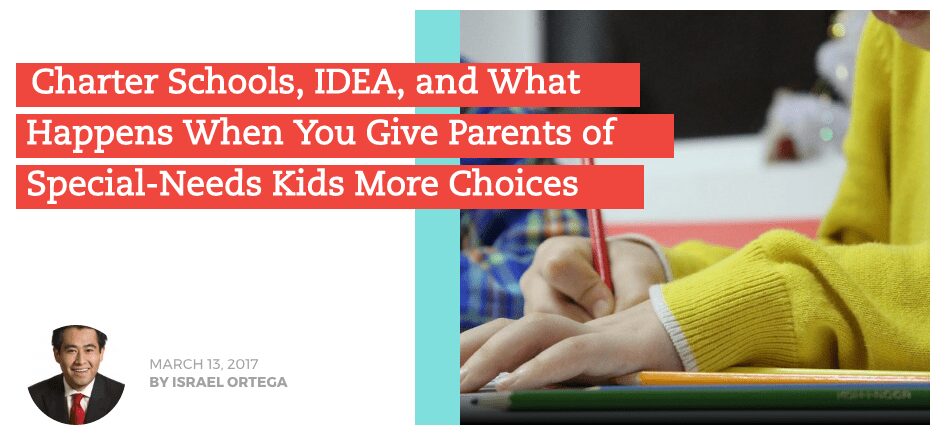The74.org doesn’t choose a side when it comes to the debate over school choice, but they do explore the issue on their Web site.
A hot-button issue in world of school choice is whether charter schools can meet the needs of children with special needs. Steve Snyder, editorial director for The74.org, joined Carrie Sheffield and Clay Aiken on Bold TV to discuss this topic.
As a former special needs educator, Clay said there’s a difference in theory and practice when it comes to charter schools accepting every kind of student. Charter schools accept students based on application and a lottery system as publicly funded schools.
Clay said:
“If I have a child with special needs in a public school system, I don’t have to apply to get in…I don’t have to have a discussion about whether or not my child goes to the school system and all of those services are provided to me.”
Public schools are required to have educators who are prepared to teach students with special needs on staff at all times. While charter schools don’t have these requirements, it is mandated that they hire special needs educators when a student who needs those services begins attending their school.
Steve said that charter schools are indeed public schools and they should be held to the same standards as public schools. He mentioned that it is “sort of illegal” when charter schools skirt the rules by discouraging parents of children with special needs from going to their school because they don’t want to hire the educators required.
Regulations for charter schools need to be more strictly enforced, the panelists agreed, especially when it comes to students with different learning needs. However, student enrollment at charter schools is increasing nationwide, Steve said. “Parents are choosing this and staying.”
“We agree at this table [that charter schools need careful regulation],” Carrie said. “Let’s expand charters, and let’s expand accessibility.”
Watch the full clip below or on our Facebook page.



























Gloone
March 17, 2017 at 9:33 pm
It doesn’t matter if they classify as a special needs student or not. I’m pretty sure all young ones this-day-and-age have special needs.
Hence, that is the entire point of education reform.
Carrie Sheffield
March 19, 2017 at 2:51 pm
There are definitely differing levels of abilities, both cognitive & physical. I don’t agree with Clay that we should mix everyone together regardless of abilities because I think gifted kids should be allowed to plow further ahead and those with disabilities should receive tailored/specialized care.
Gloone
March 19, 2017 at 3:29 pm
I agree. Special needs or those with disabilities shouldn’t get put in the same classroom. I have never seen a school that does this, but it also depends on the person’s disability.
Gifted versus Regular students or learners. Personally, I do not care for the separation, unless the person is truly gifted or a prodigy.
Say they are in 3rd or 4th grade, but should be a freshman or sophomore at a University. Then they should get sent to a gifted K-12 school somewhere and have all expenses paid for. Plus separating gifted and regular students is bad, because smarter / faster learners can help work with slower learners in group projects and classroom discussions. Then resources such as better teachers are sent to work with the “gifted kids” while the regular students miss out on opportunities to help them develop with their peers.
Then it makes you wonder how people are selected into honors or gifted programs.
I’ve seen or known kids who were selected into honors because they faked a injury on the playground and played dead in front of their teacher and freaked her out. She was like “Wow, you are a genius!”
If I had a kid, I would just sit down with them every day after school. Ask them what they learned and then have them show me. Get them in the habit of wanting to learn, ask questions and be inquisitive. I believe that is the biggest challenge for any student, parent, or teacher. Once they are capable of that, I think they will excel regardless of being gifted or not.
Jasmin Hill
March 23, 2017 at 3:30 pm
Speaking from a personal experience, I was a student who did have special needs…more of an emotional social that held me the back. I was homeschooled as a kid, then I went to a private christian school, they couldn’t help me so I was kicked out because of emotional behavior(childhood trama) and was put in a charter school. Again, the same problem, I was still not stabled and was thrown out of theme charter school and was put in a public school.
I was finally able to get help with this public school and stayed there until I graduated from the 12th grade and I’m doing even better at Framingham State University.
So, with my experience. I thank my boston public school Dorchester Academy for not throwing me out like the other schools did. They worked with me and was very successful. I’m sorry for the long story but I hope this helps with this discussion.
🙂